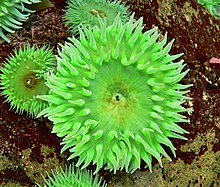
Actiniidae is the largest family of sea anemones, to which most common, temperate, shore species belong. Most members of this family do not participate in symbioses with fishes. Three exceptions are the bubble-tip anemone, snakelocks anemone and Urticina piscivora.
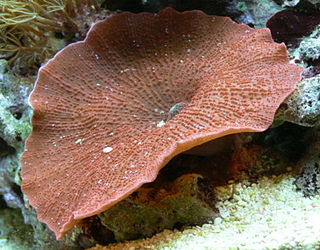
Corallimorpharia is an order of marine cnidarians closely related to stony or reef building corals (Scleractinia). They occur in both temperate and tropical climates, although they are mostly tropical. Temperate forms tend to be very robust, with wide and long columns, whereas tropical forms tend to have very short columns with a wide oral disc and very short tentacles. The tentacles are usually arranged in rows radiating from the mouth. Many species occur together in large groups, although there are recorded instances of individuals. In many respects, they resemble the stony corals, except for the absence of a stony skeleton. Morphological and molecular evidence suggests that they are very closely related to stony corals.
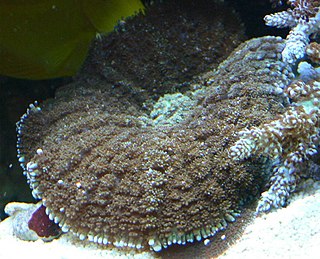
Rhodactis is genus of mushroom corals which are characterized by large individual polyps that are often reminiscent of a mushroom. Rhodactis are related to stony corals but do not produce a stony skeleton.

Aliciidae is a family of sea anemones, comprising the following genera:

Microcionidae is a family of marine demosponges.
Pandaros is a genus of demosponge in the family Microcionidae. It contains the single species, Pandaros acanthifolium.

Parazoanthus is a genus of anemone-like anthozoans in the order Zoantharia.
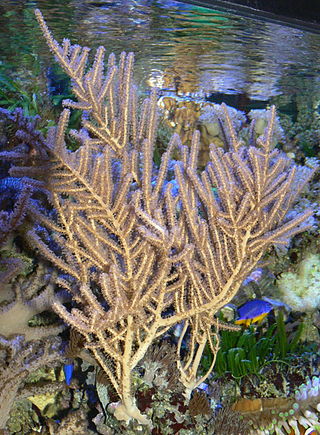
Holaxonia is a suborder of soft corals, a member of the phylum Cnidaria. Members of this suborder are sometimes known as gorgonians and include the sea blades, the sea fans, the sea rods and the sea whips. These soft corals are colonial, sessile organisms and are generally tree-like in structure. They do not have a hard skeleton composed of calcium carbonate but have a firm but pliable, central axial skeleton composed of a fibrous protein called gorgonin embedded in a tissue matrix, the coenenchyme. In some genera this is permeated with a calcareous substance in the form of fused spicules. Members of this suborder are characterized by having an unspiculated axis and often a soft, chambered central core. The polyps have eight-fold symmetry and in many species, especially in the families Gorgoniidae and Plexauridae, contain symbiotic photosynthetic algae called zooxanthellae. These soft corals are popular in salt water aquaria.
Allopathes desbonni is a species of coral in the family Antipathidae. It was described by Édouard Placide Duchassaing de Fontbressin and Giovanni Michelotti in 1864. The species is known from the Gulf of Mexico and from near the Lesser Antilles.

Plexaura is a genus of gorgonian-type octocorals in the family Plexauridae.

Plexauridae is a family of marine colonial octocorals in the phylum Cnidaria. Members of this family are found in shallow tropical and subtropical seas. Many species contain symbiotic photosynthetic protists called zooxanthellae.

Zoanthus is a genus of anthozoans in the family Zoanthidae. It is the type genus for its family and order.

Anemonia is a genus of sea anemones belonging to the family Actiniidae.

Aiptasiidae is a family of sea anemones, comprising the following genera:
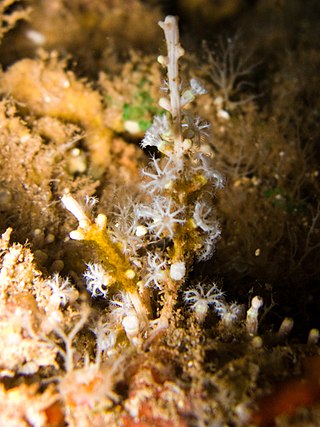
Carijoa is a genus of soft corals in the family Clavulariidae.

Briareum is a genus of soft corals in the family Briareidae. The coral is cultivated by aquarium owners for its fluorescing polyps, which reveal themselves under actinic light. The genus is in need of extensive examination, as many specimens sold by marketers display unique and similar characteristics, but are often labeled as one species, Pachyclavularia violacea.

Lebrunia is a genus of sea anemones in the family Aliciidae.

Ricordea is genus of corals. It is the only genus in the monotypic family Ricordeidae.
Leptogorgia festiva is a species of gorgonian sea fan in the family Gorgoniidae. It has been recorded in the Caribbean Sea.

Condylactis is a genus of cnidarians belonging to the family Actiniidae.
